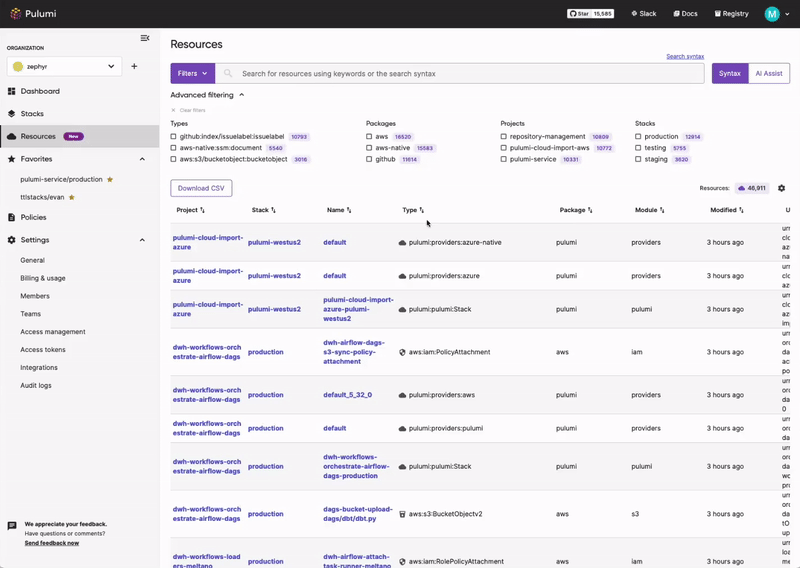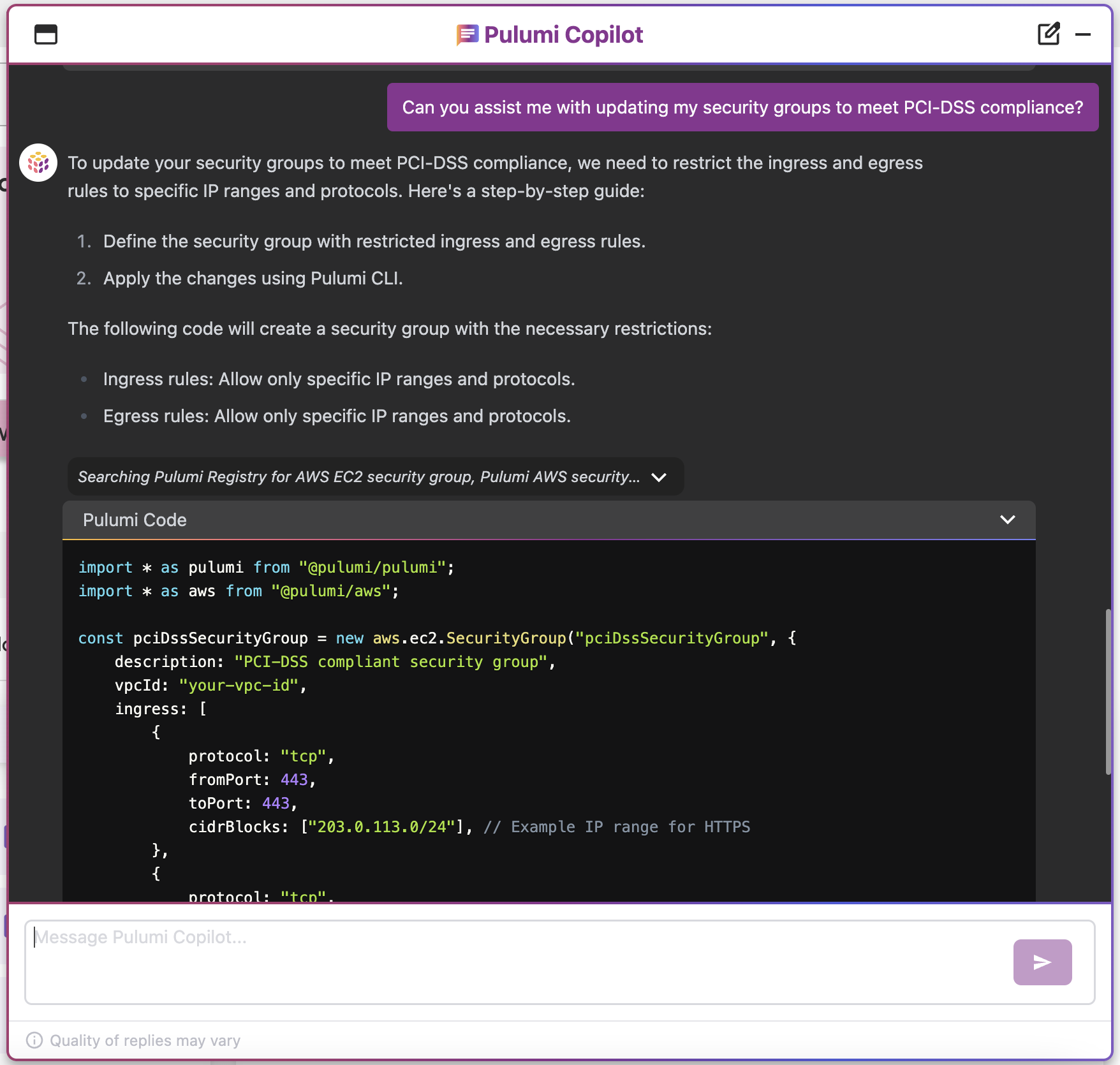How to Achieve CIS Compliance for Azure SQL Database
How to Achieve CIS Compliance for Azure SQL Database
CIS compliance is crucial for establishing strong security controls and safeguarding your cloud infrastructure against cyber threats. Pulumi can help you identify existing cloud resources that are not in compliance, and it can also enforce compliance policies proactively before infrastructure is deployed. Get started with Pulumi to use these compliance tools or speak with a Solutions Architect to get an expert consultation.
What is CIS Compliance?
CIS (Center for Internet Security) Compliance refers to the adherence to security best practices outlined by the CIS, a nonprofit organization that develops globally recognized security standards. These best practices are known as CIS Controls and CIS Benchmarks, which provide guidelines for securing various technologies and systems, including operating systems, cloud services, network devices, and software.
Key Aspects of CIS Compliance
- Implementation of Controls: Start by implementing the CIS Controls relevant to your organization's size and risk profile.
- Use CIS Benchmarks: Configure your systems and applications according to CIS Benchmarks.
- Regular Audits: Continuously monitor and audit your systems to ensure ongoing compliance with CIS recommendations.
- Automation Tools: Consider using CIS-CAT (CIS Configuration Assessment Tool) or other automation tools to assess and enforce compliance across your infrastructure.
Benefits of CIS Compliance
- Standardized Security: Ensures that your organization follows industry-recognized security best practices.
- Risk Reduction: Helps in reducing the attack surface by implementing critical security controls.
- Compliance with Other Standards: CIS Controls and Benchmarks often overlap with other compliance frameworks like PCI-DSS, NIST, and ISO, making it easier to achieve multiple compliance goals simultaneously.
- Improved Incident Response: By implementing CIS Controls, organizations are better equipped to detect, respond to, and recover from security incidents.
Pulumi Insights
Use Pulumi Insights to gain visibility into your cloud infrastructure's configuration to assess CIS compliance. Pulumi Insights is Intelligent Cloud Management. It helps you gain security, compliance, and cost insights into the entirety of your organization's cloud assets and automatically remediate issues.

Pulumi Copilot
Use Pulumi Copilot to assist configuring your infrastructure to make it compliance ready. You can tap into the Pulumi Copilot's deep understanding of your organization's context to gain visibility into the configuration of resources and assess their compliance.

Compliance Ready Policies
With comprehensive coverage of Azure, Pulumi Compliance Ready Policies provide an enhanced level of control and governance over your cloud resources. Pulumi Compliance Ready Policies empower you to enforce best practices, security standards, cost controls, and compliance requirements seamlessly within your infrastructure-as-code workflows.
What is Azure SQL Database?
Azure Database is a suite of fully managed, scalable, and secure relational database services designed for various database engines, including SQL Server, MySQL, PostgreSQL, and MariaDB. These services handle tasks like backups, patching, and high availability, allowing developers to focus on building applications rather than managing infrastructure. With features like built-in security, automated scaling, and integration with Azure ecosystem tools, Azure Database ensures seamless data management for enterprise and cloud-native applications.
What controls can I put in place to evaluate Azure SQL Database resources?
- Azure SQL Database backups should be private
- Azure SQL Database instances should prohibit public access, as determined by the Public Network Access configuration
- Azure SQL Database instances should have encryption at-rest enabled
- Azure SQL Managed Instances and database backups should be encrypted at-rest
- Azure SQL Database instances should be configured with availability zones for high availability
- Azure SQL Database instances should have monitoring enabled with Azure Monitor or Log Analytics
- Azure SQL Managed Instances should have automatic backups and geo-replication enabled
- Azure SQL Database instances should have automatic backups enabled
- Azure SQL Database instances should have deletion protection enabled
- Azure SQL Database instances should log activities to Azure Log Analytics
- Azure Active Directory (Azure AD) authentication should be configured for Azure SQL Databases
- Azure SQL Database instances should have automatic backup enabled
- Azure SQL Database clusters should have automatic minor version upgrades enabled
- Azure SQL Managed Instances should have transparent data encryption (TDE) enabled
- Azure SQL Database instances should be configured with availability zones for high availability
- Azure SQL Database instances should be configured to copy tags to backups
- Azure SQL Database instances should be deployed in a Virtual Network (VNet)
- Existing Azure SQL Database event notification subscriptions should be configured for critical database events
- Azure SQL Database event notification subscriptions should be configured for critical database performance events
- Azure SQL Database instances should use non-default ports for connections
- Azure SQL Database instances should use custom administrator usernames
- Azure SQL Database instances should be protected by a backup and recovery plan
- Azure SQL Managed Instances should be encrypted at rest
- Azure SQL Database instances should be tagged
- Azure SQL Database backup and recovery configurations should be tagged
- Azure SQL Database instances should be tagged
- Azure SQL Database security policies and rules should be tagged
- Azure SQL Database subnet groups should be tagged
- Azure SQL Database clusters should log audit events to Azure Monitor
- Azure SQL Database instances should have automatic minor version upgrades enabled
Speak to a Solutions Architect to implement policy as code to manage SQL Database resources for CIS compliance.
Talk to a Solutions Architect
Get in touch with our Solutions Architects to get all your resources in use with Pulumi Insights